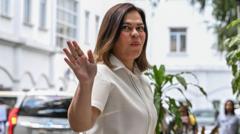In this article, we analyze Uruguay's current political landscape as the nation heads to the polls, highlighting issues like crime, child poverty, and an aging populace while comparing it with political climates in other regions.
Uruguay's Upcoming Election: Key Issues and Candidates to Watch

Uruguay's Upcoming Election: Key Issues and Candidates to Watch
As Uruguay prepares for its presidential election, the focus shifts to pressing social challenges and contrasting political ideologies.
In just a few days, Uruguay will hold presidential elections amid rising crime rates, an aging demographic, and persistent child poverty, marking a pivotal moment for this relatively peaceful Latin American nation. The election, set for Sunday, will see approximately 3.4 million citizens weighing deeply significant issues that affect their everyday lives.
Uruguay is viewed as a stable democracy in Latin America, often contrasting starkly with the more turbulent political environments of its neighbors and countries like the United States. The incumbent president, Luis Lacalle Pou, is unable to run again due to constitutional limitations. His conservative coalition's success or failure will determine the continuation of policies aimed at economic trends and public safety.
Key candidates are at the forefront of this electoral significance. The leading candidate from the opposition is Yamandú Orsi, who represents a more moderate leftist stance and has previously governed the country during a period from 2005 to 2020. During his administration, Uruguay underwent notable reforms, including the legalization of marijuana and progressive energy policies. His candidacy raises concerns among conservative supporters about a potential trade deal with China, with Orsi indicating a preference for Mercosur negotiations over direct dealings.
Whichever candidate emerges victorious will face the immediate necessity of addressing critical societal issues. The aging demographic poses long-term challenges for healthcare and social services, while the issue of child poverty remains acute, putting pressure on social welfare systems. Additionally, violence linked to drug gangs has heightened safety concerns, slowly eroding Uruguay's reputation as a serene South American nation.
As the election draws near, the stark choices facing voters provide a meaningful opportunity for dialogue about the future of governance and societal investment in Uruguay.
Uruguay is viewed as a stable democracy in Latin America, often contrasting starkly with the more turbulent political environments of its neighbors and countries like the United States. The incumbent president, Luis Lacalle Pou, is unable to run again due to constitutional limitations. His conservative coalition's success or failure will determine the continuation of policies aimed at economic trends and public safety.
Key candidates are at the forefront of this electoral significance. The leading candidate from the opposition is Yamandú Orsi, who represents a more moderate leftist stance and has previously governed the country during a period from 2005 to 2020. During his administration, Uruguay underwent notable reforms, including the legalization of marijuana and progressive energy policies. His candidacy raises concerns among conservative supporters about a potential trade deal with China, with Orsi indicating a preference for Mercosur negotiations over direct dealings.
Whichever candidate emerges victorious will face the immediate necessity of addressing critical societal issues. The aging demographic poses long-term challenges for healthcare and social services, while the issue of child poverty remains acute, putting pressure on social welfare systems. Additionally, violence linked to drug gangs has heightened safety concerns, slowly eroding Uruguay's reputation as a serene South American nation.
As the election draws near, the stark choices facing voters provide a meaningful opportunity for dialogue about the future of governance and societal investment in Uruguay.






















